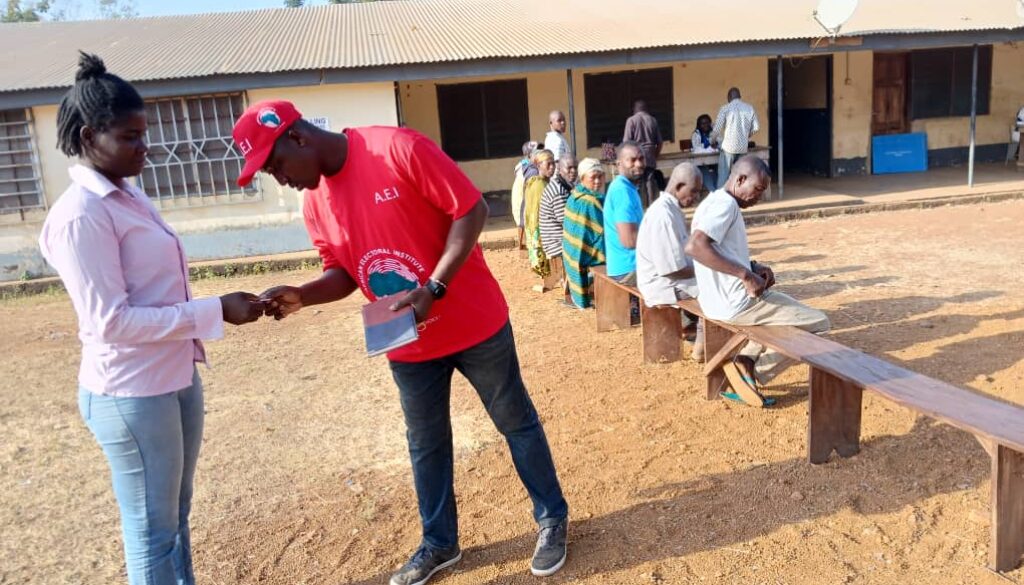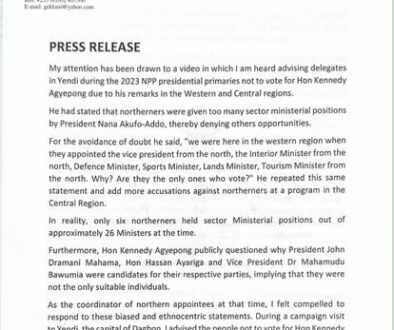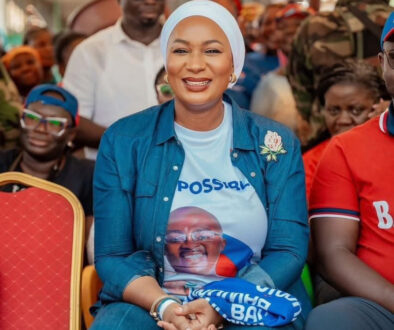AEI report on 2024 general election reveals absence of agents of “minority political parties’ in many polling stations & constituency collation centres
EXECUTIVE SUMMARY:
The African Electoral Institute (AEI) observed the 2024 general elections in Ghana, which took place on December 7, 2024. Despite being denied accreditation by the Electoral Commission (EC), AEI deployed volunteers across all regions, except Bono East, to monitor the elections.


A voter approached a volunteer at polling station to ask questions…
The following political parties and independent candidates successfully secured spots on the ballot for the 2024 presidential election:
- New Patriotic Party (NPP)
- Great Consolidated Popular Party (GCPP)
- Ghana Freedom Party (GFP)
- Ghana Union Movement (GUM)
- Liberal Party of Ghana (LPG)
- National Democratic Party (NDP)
- Convention People’s Party (CPP)
- National Democratic Congress (NDC)
- All People’s Congress (APC)
Additionally, four independent candidates also made it onto the ballot:
- Kofi Koranteng
- George Twum Barima Adu
- Nana Kwame Bediako
- Alan Kyerematen
METHODOLOGY:
AEI volunteers observed the elections in four core areas:
- General Conduct of the Elections: Volunteers monitored the overall conduct of the elections, including the behaviour of electoral stakeholders.
- Security Situation: Volunteers observed the security arrangements at polling stations, including the presence of security personnel and incidents of violence.
- Function of Electoral Equipment: Volunteers monitored the functionality of electoral equipment, including the Biometric Verification Device (BVD) machines.
- Presence of Political Party Agents: Volunteers observed the presence of political party agents at polling stations and their level of participation in the electoral process.
KEY FINDINGS:
1. Peaceful Elections: The general conduct of the elections was peaceful, with well-measured conduct from all electoral stakeholders.
2. Security Incidents: Despite some incidents of electoral violence, the overall security situation was good. Volunteers reported violence in several constituencies, including:
2.1. Nsawam Agogyari constituency in the eastern region where there were disputes as to which candidate has emerged winner of the parliamentary election.
2.2. Okaikwei Central Constituency in the Greater Accra Region, where the collation centre was attacked and everything destroyed just at the tail end of the collation.
2.3. Aprontu Akontombra in the Western North Region were a voter insisted to carry a bag into the polling booth.
2.4. Tolon constituency in the Northern region was one death was recorded. Our volunteer at the collation centre nearly got stabbed, and his mobile phone was snatched from his hands.
2.5. Damango constituency also recorded electoral violence, and the EC office was burnt down.
2.6. Fanteakwa constituency in the Eastern region also recorded violence based on parliamentary results.
On security and electoral violence, the AEI’s Electoral Security Department pinned down Bawku in the Upper East Region, as a flash point due to the simmering conflict in Bawku that exacebated immediately before the election; but Bawku rather was election violence free per our volunteer’s report.
Also, volunteers reported that the security personnel at the polling stations were the Ghana Police, Immigration, and Fire Service, and their name tags were properly stamped on the uniforms and they were very professional and civil.
The military was not at the poling stations, but at Okaikwei Central Constituency, the military was sighted in their war tanks on the Abeka road.
- Electoral Equipment: The incidence of electoral equipment malfunction was significantly lower compared to the registration exercise. Notably, the only recorded breakdown occurred in the Sisala West constituency, where a Biometric Verification Device (BVD) machine was reported to be non-functional.
- Presence of Party Agents: The presence of political party agents was a notable concern. The African Electoral Institute (AEI) observed that many political parties, despite being on the ballot, failed to deploy agents to protect their interests on election day. This was evident during the registration and transfer exercises, where only a few parties had skeletal agents present. In specific instances, AEI volunteers reported that:
At Tampoe primary school in Jirapa, only NDC, NPP, and Independent candidate Alan’s agents were present.
At Pulima primary school, only NDC, NPP, and LPG had agents.
In Bia West, NDC, NPP, GUM, and CPP had skeletal agents.
The absence of party agents from smaller political parties was a recurring theme throughout the elections. This lack of representation raises concerns about this recurring pattern by these political parties making them a weak link in the democratic process noting them as only interested in Inter Party Advisory Committee (IPAC) meetings and having just their names on ballot papers but ignore mostly other important portions of the electoral process.
Most of the issues regarding Pinksheets in most of the electoral disputes regarding recollation could have been largely resolved if these “minor political parties” had their agents and their Pinksheets could have also been relied on.
AEI is therefore suggesting that these parties may not have the necessary infrastructure or personnel to participate effectively in our democratic process.
CONCLUSION:
The 2024 general elections in Ghana were largely peaceful, with some incidents of electoral violence.
The Electoral Commission’s decision to deny accreditation to numerous civil society organizations (CSOs) was a disappointing move. This denial hindered the ability of these organizations to effectively monitor the elections, ensuring transparency and accountability African Electoral Institute volunteers witnessed this firsthand, as they only encountered CODEO representatives at polling stations, while most stations had no CSO presence at all. This lack of CSO oversight raises concerns about the integrity and fairness of the electoral process.
AEI calls for the amendment of electoral laws to address the collation and declaration standoff that has led to the petition of some election results.
RECOMMENDATIONS:
1. Amend Electoral Laws in Transmission of Pinksheets and Collation: Amend electoral laws to address the collation and declaration standoff. For example, the Pinksheet in each polling station should be scanned directly to region or national, and an independent body, such as the district court, should be a copy of each Pinksheet from each polling station.
2. Increase Transparency: Ensure constituency certified collated results are pasted on the collation centre wall as prescribed by C.I 127. A copy of the Pinksheet from each polling station should be transmitted to the EC regional and national headquarters for preservation in case the collation centre and political parties lose their copies.
3. Enhance Security: Ensure that the security operations at collation centres should be tight to avoid invasion and takeover by unauthorized persons, leading to the breakdown of collation and declaration.
4. Promote Inclusivity:The EC should prioritize;
1. Civil Society Organisations (CSOs)when granting accreditation, especially those specializing in electoral and democratic governance.
2. The Media should be granted comprehensive and wide accreditation to monitor eletions.This is crucial because CSOs and the media play a vital role in promoting transparent and accountable electoral processes due to their grassroots presence, ultimately leading to more credibility and integrity of the elections,and for the EC to demonstrate its commitment to transparency and accountability in the electoral process.
-END-






